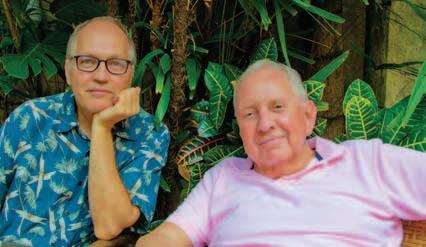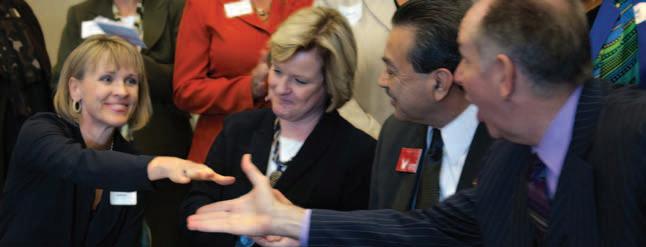
4 minute read
PartnershiPs
eXPloring health and resilience aMong lgbt seniors
IInnovative research can open doors at the highest level and influence decisions affecting millions of people. Consider Karen Fredriksen-Goldsen’s breakthrough study on health disparities facing lesbian, gay, bisexual and transgender seniors—a group whose numbers are expected to more than double by the year 2030, reaching more than 4 million. Her research, recently presented at a White House conference and at an earlier congressional briefing, spotlights how long-standing social challenges can seriously affect personal well-being. With data she and her colleagues gleaned from 2,560 respondents, ages 50 to 95, the study shows that a lifetime of adversity can create barriers to optimal health as well as foster personal resilience.
Advertisement
For example, social stigma may inhibit physicians or patients from discussing sexuality and, as a result, restrict information about HIV risk, breast or prostate cancer, hepatitis and hormone therapy, as well as discussion of risk behaviors that have a higher incidence among some LGBT seniors such as smoking and drinking. And legal constraints placed on same-sex partnerships deny assistance available to opposite-sex married couples, such as federal family leave and Social Security benefits.
Adversity, however, also creates resilience, and weak institutional support can contribute to powerful friendships and loving partnerships that sustain and enrich the lives of individuals as they age. These and other findings are helping to inform a larger national effort to shape health care policies, define support systems, and develop interventions that benefit a diverse senior population.
As principAl investigAtor of Caring and aging wiTh Pride, KAren i. fredriKsen-goldsen is leAding the first nAtionAl federAlly funded study on heAlth dispArities of lgBt older Adults And their cAregivers.
toP-ranKed among soCIaL WorK gradUate sChooLs In 2012, U.S. News & World Report ranked the University of Washington school of social Work third among the nation’s nearly 220 schools with master of social work programs.
changing the lives of chilDren with UneXPlaineD stoMach Pain
WWhat do we learn from our parents? What do we pass on to our children? sometimes the legacy is positive; at other times, negative patterns contribute to a new generation of children who suffer needlessly. the school’s rona levy has found that such a transgenerational dynamic is present in one of the most common childhood complaints: stomach pain with no discernible cause. in addition to exploring this transgenerational pattern, levy has identified effective ways to disrupt it. the answer is close to home: Parents have the power to make a positive impact on their children’s symptoms by changing how they direct their caring attention.
in three face-to-face sessions, clinicians trained parents to alter their responses to their children’s complaints. they also taught the children simple coping skills, including deep breathing and muscle relaxation. the result was a significant, long-term reduction in the children’s reported symptoms, compared to a control group.
Moving from research to practice, the study gives health care providers and families a low-cost protocol that’s easy to implement—with the potential to return children to their normal activities, reduce health care costs and mitigate years of unnecessary pain.
Pioneering a more effective response to a distressing, often chronic, childhood complaint is just the beginning: levy’s cross-generational approach to health issues has profound implications for a wide range of chronic conditions, including children at risk for obesity.
ronA levy is internAtionAlly Known for her groundBreAKing reseArch in BehAviorAl medicine. she is A professor of sociAl worK; Adjunct professor of psychology, depArtment of psychology; And Adjunct professor of medicine, division of gAstroenterology At the university of wAshington.
Partnerships
How collaboration ignites action


leaDing a stateWiDe alliance to strengthen chilD Welfare eXPertise
Iin times of diminished funding, smart new partnerships are critical to amplifying scarce resources. in 2010, state social work leaders began exploring the best way to enhance professional training for Washington’s child welfare professionals. it was clear that the training must meet consistently high standards, be offered in diverse locations, and integrate research and evaluation tools to measure results over time. in 2012, the alliance for child Welfare excellence, a statewide partnership spearheaded by the school of social Work, offers comprehensive training and education in three regions across the state, while incorporating a continuum of research and assessment measures to determine outcomes for vulnerable children and families. this integrated approach is a first in the nation.
the alliance model provides greater training and coaching capacity both statewide and locally, delivered through a mix of in-person training, online sessions and webinars. the participation of eastern Washington University expands the training infrastructure, preparing social workers to be responsive to the challenges in the eastern part of the state.
the stakes have never been higher: nearly 10,000 children and about 7,800 families in Washington receive state-supported child welfare services every month, including 90 percent of children in foster care. by sharing curricula, delivery methods and evaluation tools, the alliance can better serve families by seamlessly moving social workers from training to front-line service.
photo: pArtners for our children co-founder connie BAllmer (left) And uw president michAel young (right) shAre A congrAtulAtory moment with depArtment of sociAl And heAlth services secretAry roBin ArnoldwilliAms And eAstern wAshington university president rodolfo ArévAlo At the AlliAnce signing ceremony.


